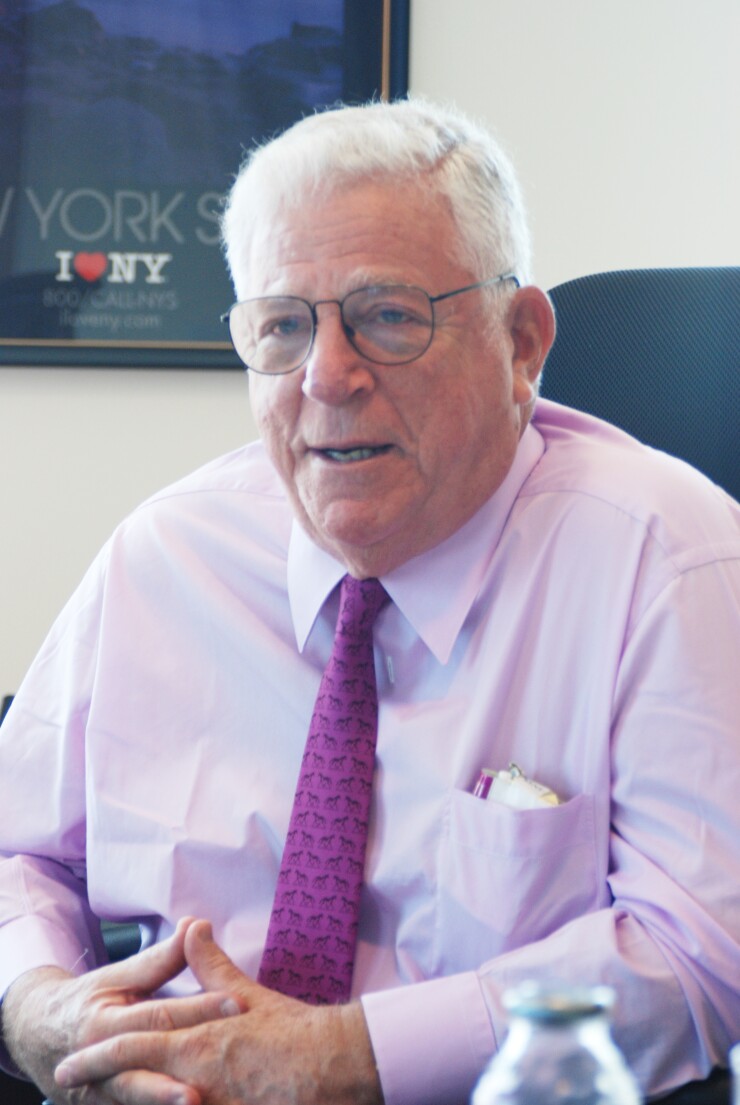
BOSTON - New York's mass transit funding problem is "a mess," said public finance veteran Richard Ravitch.
Ravich, a former Metropolitan Transportation Authority chairman who crafted the MTA's initial capital program in 1981, said Gov. Andrew Cuomo for several months essentially sat on the MTA's proposed five-year, $32 billion plan for 2015 to 2019. Then, said Ravitch, Cuomo and the MTA overreached by asking New York City to quintuple its contribution to $3.2 billion.
A three-way political drama among MTA, Cuomo and New York Mayor Bill de Blasio has percolated since last fall, when a state review board rejected without prejudice the initial request, citing a $15 billion funding gap. The MTA is a state agency, even though it primarily serves metropolitan New York.
"The capital plan was relatively modest, in my judgment," Ravitch said in an interview at the Brandeis municipal finance conference at the Federal Reserve Bank of Boston. "It was ignored by the governor, then finally, six months later, he made some suggestions."
Late last month, MTA Chairman Thomas Prendergast said internal efficiencies and a move toward design-build project development - for which state officials pushed -- could whittle the capital plan shortfall from $14 billion to about $11.5 billion.
After Cuomo said July 28 he would put an additional $8.3 billion for the capital plan in next year's budget request, Prendergast asked the city to commit $3.2 billion, way up from the $657 million it budgeted.
"That was uncalled for," Ravitch said of Prendergast's request. "The city's capital budget should not be burdened."
Roughly $3 billion of the plan is self-funded through bridge and toll revenue.
Ravitch, a former lieutenant governor, New York mayoral candidate and part-time consultant on the Detroit bankruptcy, also questioned where Cuomo would find the extra $8.3 billion for the MTA. The governor said he doesn't want to burden riders with fare increases beyond the biennial hikes now in force, and indexed to the inflation rate.
Prendergast, in a recent letter to de Blasio, called the MTA's request of the city "fair and reasonable," given the system's benefit to the city's economy.
"They have a growing population across the city," said Ravitch, now a board member of the think tank Volcker Alliance, "They have twice as many people using the system as they did when I left the MTA." Ravitch said the signalization improvements the MTA is budgeting in the capital plan is a step toward alleviating subway overcrowding.
The political climate, said Ravitch, doesn't help.
"Infrastructure is not as high a priority as keeping the taxes from going up," said Ravitch. "Politicians' preference to borrow more has dominated our political culture."
His solution: "Elect better politicians."
Ravitch, while MTA chairman, was often at odds with Cuomo's father, Mario, while the latter was governor.





